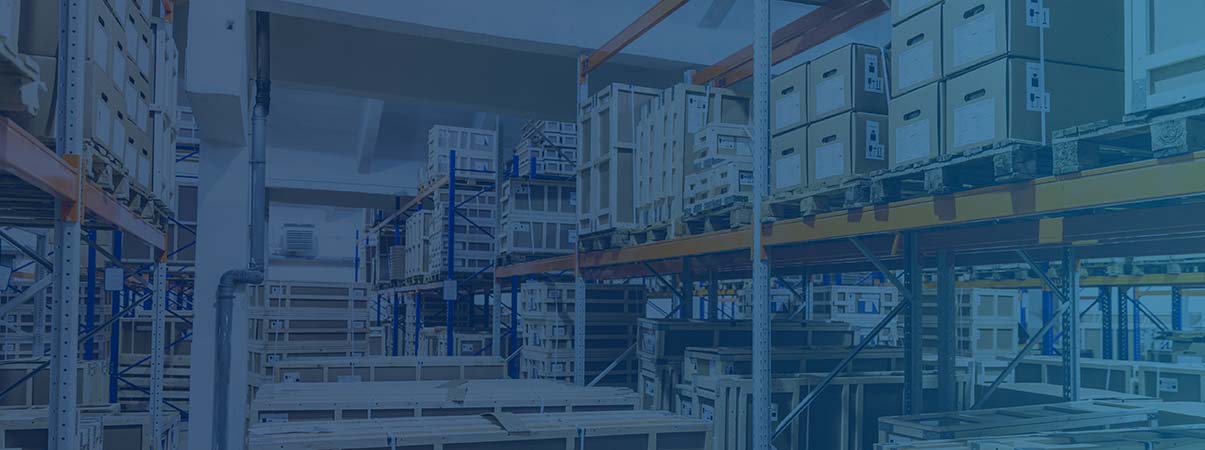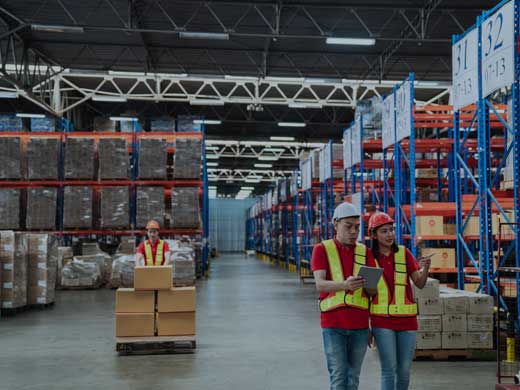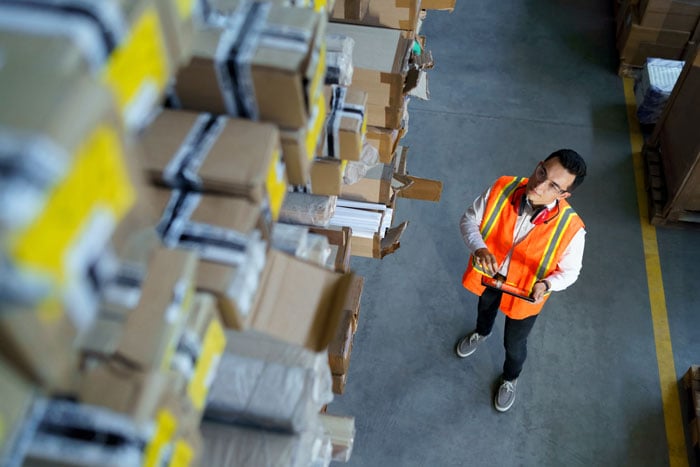Rapid growth is a good problem to have.
But it’s still a “problem.” It means your small or medium-size manufacturing business is trying to solve some painful and challenging problems.
Perhaps customer demand has led to your running out of warehouse space. Or, your picking and packing team is overwhelmed with orders and you can’t efficiently add any more work shifts.
Or, you’ve entered a new market and it doesn’t make business sense to store, fulfill, and ship all your orders from your current facility.
Expanding your order fulfillment and shipping capability would take up a lot of your time and resources. What’s more, you’re not even sure about the sustainability of this momentum: Is it short- or medium-term growth?
That’s where a vendor offering 3PL logistics may make business sense.
What is 3PL logistics?
First, the abbreviation: 3PL stands for “third-party logistics.”
Just as you may resort to a temp agency to get extra office or factory help, you can call on a 3PL company to outsource activities such as the following: shipping, picking-and-packing, warehousing, procurement, inventory management, customs-related work, freight audits, payment, and shipment tracking.
Some 3PLs offer domestic and international transportation, while others go as far as designing omnichannel logistics solutions.
Why work with a 3PL vendor?

Scale more easily
When you’re growing fast, a 3PL vendor can give you the flexibility to expand your shipping and fulfillment capabilities with relative ease. That agile response can be fundamental to securing or reinforcing the confidence of your customers.
Since many 3PL vendors have a specialty in their service offering, you can match up with a vendor whose technological sophistication may make you more productive.
Take for example a 3PL focused on transportation. Due to their specialization, they may have a transportation management system (TMS) that offers streamlined and automated routines that simplify your shipping operations, from efficient routing to transparent real-time shipment tracking and greatly reduced paperwork.
Or, a 3PL may have a fulfillment specialty. For example, one of our customers sells yogurt to Costco. The retailer requires that the yogurt be sold in packages of two. Our customer’s 3PL vendor takes care of these packaging requirements.
Sometimes, 3PL vendors work in your supply chain because your customers have exclusive contracts with them. For example, the Métro grocery chain has its distribution handled by a 3PL called DMB. One of our customers sells to Métro and must, therefore, work with DMB.
Save time and money
Consider what setting up a new warehouse would take: finding the right physical space; outfitting it with the equipment and technology you need; getting up to speed on this technology; recruiting and training staff; paying employment taxes, salaries, and benefits, as well as taking care of all your transportation needs in the new location.
Or, you could simply contract with a 3PL vendor that will take care of that end of your operation. In the meantime, your team can focus their time and resources on managing the balance of your day-to-day priorities.
Another way you can economize on costs is by using a 3PL vendor as key support for your just-in-time manufacturing process. For example, in the food and beverage industry many of the ingredients in the manufacturing process are perishable and, thus, need to be stored in refrigerated, often very large, spaces.
Instead of storing these items on your premises, you can store them at your 3PL’s warehouse, and have them shipped to your plant on a schedule that efficiently meets your demand.
Here is the English translation:
ERP software can help you tackle your industry’s challenges. Learn how by reading our post, '' How to Protect Your Small Business’s Profits When Inflation Hits Supplier Prices ''.
Expand into unfamiliar markets
New markets may have unfamiliar frameworks of legal and industry standards. For example, if you were a Canadian manufacturer entering the U.S. market, you could greatly simplify your commercial activities by working with a creditable 3PL vendor. Such a company would have the necessary accreditations, standards compliance, and supply chain expertise demanded by doing business in your targeted U.S. location.
What is 4PL and how is it different from 3PL?

To get a quick understanding of the difference between 3PL and 4PL (fourth-party logistics) companies, imagine that a 3PL is like an independent contractor. The 3PL generally owns their assets, like warehouses and trucks. They’re focused mostly on daily operations and need to be managed day-to-day.
The 4PL company is more like a strategic partner, a long-term commitment as you might have with a key executive on your team. Their main job is to integrate and optimize your entire supply chain, from a birds-eye point of view.
So, within their purview, 3PL services may be included, but a 4PL is also overseeing your manufacturing, inventory procurement, and transportation while also optimizing how everything works together.
At this point, you may be thinking that working with a 3PL could be advantageous. It just might be, but do keep in mind three key guidelines to maximize your chances of a mutually beneficial relationship.
3 guidelines for a healthy 3PL relationship

1. You need to be on the same page
Let’s say you’ve found a 3PL that serves your particular industry and thus can comply with all the regulations and standards of the sector. This 3PL is going to handle your order fulfillment and delivery.
That means you’re going to give up some control of operations that will affect your customer relationship. So, your 3PL needs to understand your business, what you want to accomplish, and how the 3PL’s services fit into your goals.
Naturally, your Service Level Agreement (SLA) will have to be explicit about service expectations. And since service is what the 3PL is all about, do check up on references to find out how reachable and responsive their customer service is.
2. Ensure good technological integration between the two companies
It goes without saying that you already have an ERP system helping you run your business. If not, you’re using siloed software and manual methods for tracking inventory and all your order fulfillment and shipping documentation. In such a case, the administrative burden for both companies will be labour-intensive, error-prone, and sluggish.
To ensure real-time and efficient communication between the two companies, confirm that your ERP connects easily with the 3PL. Tight integration enables your ERP users to see in real-time when inventory is being received and when orders are being picked, staged, shipped, and processed by the 3PL. Simultaneously, you’ll have a real-time view of stock levels, so you’ll know how to adapt your production accordingly.
3. Stay on top of 3PL costs
Over and above your financial agreement with your 3PL, external factors may also impact what your relationship costs you.
Remember, the 3PL is negotiating pricing with its vendors, such as truckers, staffing companies, and so on. These evolving sub-contracting relationships can affect your costs, as can other factors, such as new laws and regulations, weather, power outages, cyberattacks, etc. What may have been a cost-efficient relationship at first may evolve into one that’s not.
To learn more about how ERP software can help you overcome industry concerns, read our post, “4 Food and Beverage Supply Chain Challenges that ERP Software Can Help You Overcome.”
Choosing to work with a 3PL is not a simple decision. Sift through all the variables. Talk to people who have worked with 3PLs. Ask yourself if you have the in-house resources necessary, whether a 3PL will indeed make you more efficient, and finally, does such a relationship make financial sense.
If you have more questions, do reach out to us.





